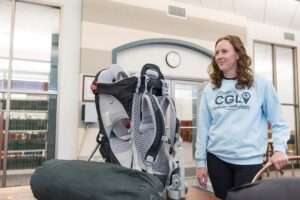
Harrisonburg, Virginia, in the heart of the Shenandoah Valley, is surrounded by mountains. Most of those mountains are public land, whether it be the remote and rustic George Washington National Forest, or the iconic Shenandoah National Park, there dozens upon dozens of hikes and recreational opportunities within an hour’s drive. If getting outdoors and connecting with the land has been your preferred mode of recreation all your life, or something you’re curious about but have done very little, Harrisonburg is an ideal place to explore.
But for a lot of people, the mountains that are geographically close are out of reach. That is because access to public land, while easy in theory, has many hidden barriers. The Community Gear Library, one of Virginia Organizing’s newest Joint Plan of Work partners, seeks to address all of them, from the personal to the systemic. Their goal is to help community members get outdoors by breaking down the barriers of cost and access.
Harriet Flynn, the organization’s founder, has been an outdoor enthusiast her entire life, and her day job is as a Program Supervisor at Harrisonburg Parks and Recreation.
“My jobs have always revolved around getting people outdoors and having new experiences,” she says. “I believe everyone should be able to do it if they want to.”
Harriet is troubled by the fact that the outdoors is a de facto white space – a space that has historically been unsafe for BIPOC community members, and a place that BIPOC and low-income community members struggle to afford. The high cost of gear, such as tents, sleeping pads, sleeping bags, and trekking poles, and the consequent lack of experience with outdoor gear, makes the prospect of a camping trip seem unrealistic for many. And in the Shenandoah Valley, a violent history of eviction and segregation of outdoor spaces has sent the explicit message that not all are welcome. Running a gauntlet of Confederate flags just to get to the trailhead makes the environment intimidating for would-be BIPOC trail users.
The Community Gear Library partners with the Massanutten Regional Library to lend out hiking and camping gear for free. To become a borrower, one must simply obtain a library card and attend an information session to get a basic tutorial on how to use the equipment. So far, the Gear Library has hosted three BIPOC hikes to introduce community members to safe, accessible trail options in the area – visible, highly trafficked spots located on major roads, enjoyed as a group to provide safety in numbers.
The Gear Library officially opened in August, and so far has loaned out three camping kits and a set of hiking poles to a total of nine people. It is a small beginning, but the group is growing as it acquires more equipment and engages in extensive outreach in the community.
“I would like to see our model replicated at libraries everywhere,” Harriet says. “There should always be free resources for outdoor equipment, and programs like this should be run by public libraries. Ours is just the second one to do this.”
The growth of the Community Gear Library depends on cash donations. They do not accept used gear. By purchasing new equipment from business partners, they are able to have sets of identical items, allowing for interchangeable parts, meaning easier repairs and a more sustainable supply. If you would like to support their work, you can visit their website here.




